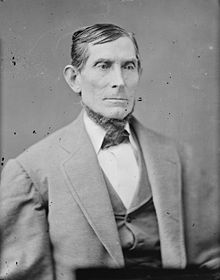James D. Williams
| James D. Williams | |
|---|---|
 |
|
| 17th Governor of Indiana | |
|
In office January 8, 1877 – November 20, 1880 |
|
| Lieutenant | Isaac P. Gray |
| Preceded by | Thomas A. Hendricks |
| Succeeded by | Isaac P. Gray |
| Member of the U.S. House of Representatives from Indiana's 2nd district |
|
|
In office March 4, 1875 – December 1, 1876 |
|
| Preceded by | Simeon K. Wolfe |
| Succeeded by | Andrew Humphreys |
| Member of the Indiana Senate | |
|
In office 1860–1872 |
|
| Member of the Indiana House of Representatives | |
|
In office 1844–1860 |
|
| Personal details | |
| Born | January 16, 1808 Pickaway County, Ohio |
| Died | November 20, 1880 (aged 72) Indianapolis, Indiana |
| Political party | Democratic |
| Spouse(s) | Nancy Huffman |
| Children | Seven |
| Profession | Farmer |
| Religion | Methodist |
| Nickname(s) | Blue Jeans Bill |
James Douglas Williams (January 16, 1808 – November 20, 1880), nicknamed Blue Jeans Bill, was a farmer and Democratic politician who held public office in Indiana for four decades, and was the only farmer elected as the Governor of Indiana, serving from 1877 to 1880. He also spent twenty-eight years in the Indiana General Assembly, and was well known for his frugality and advocacy of agricultural development.
James Douglas Williams was born on January 16, 1808 in Pickaway County, Ohio, the son of George and Sarah Cavendar Williams. He moved with his family to Knox County, Indiana at the age of 10, and his family moved and settled near Monroe City, Indiana where he remained much of the rest of his life. He received little schooling, but did occasionally attend the log schoolhouse near his home, only attending until the fifth grade. Williams' father died in 1828, and being the oldest son, Williams became the caretaker of his family, continuing to run his father's farm. In 1831 Williams married Nancy Huffman, and together they had seven children. With Williams regularly in public service, she ran the family farm for much of her life—a three thousand acre spread in the central part of Indiana.
Throughout his life, Williams was known for his farm dress, earning him the nickname Blue Jeans Bill, because he so often wore denim. He used the nickname and the reputation that came with it to cast himself as a man of the people, and a countryman in his public elections. As he became more wealthy, he began to have suits made of denim and lined with silk. Besides being a farmer, Williams was active in studies and experimentation in trying to produce superior crops. He was a member of several local and regional farm organizations and regularly won first place in many of the Indiana State Fair competitions.
In 1839 Williams first entered public service serving as justice of the peace of Vincennes, Indiana until he resigned in 1843. The same year he was elected to the Indiana House of Representatives and served until 1860, moving to the Indiana Senate where he served until 1872. Williams was responsible for the authorship of many bills, including laws that permitted widows to inherit the estate of their husbands. He wrote the bill that established the state's first sinking fund and also encouraged the development of the State Board of Agriculture and served as a member for sixteen years.
...
Wikipedia
